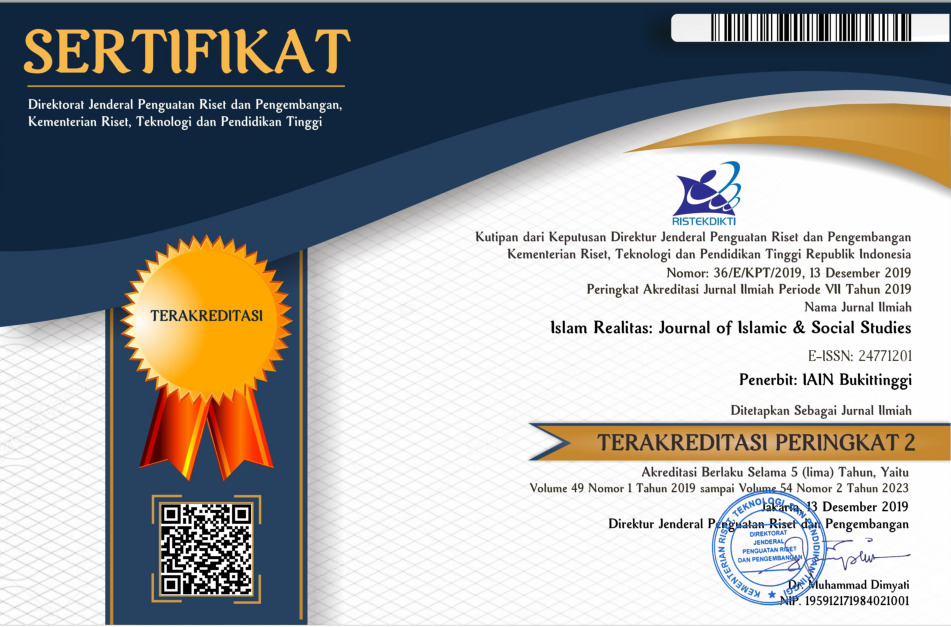Transnational Organization: Religious Moderation Among Jamaah Tabligh (JT) in Pekanbaru City
DOI:
https://doi.org/10.30983/islam_realitas.v10i2.8669Keywords:
Jamaah Tabligh (JT), Religious Moderation, PreachingAbstract
While the Tabligh Jamaat is perceived as phenomenal in its acts of worship (appearing distinct from most other Muslim groups), it demonstrates moderate behavior in societal interactions. In line with other research findings, the Tabligh Jamaat is regarded as a politically neutral organization, which calls for further exploration of its position in implementing the values of religious moderation. Thus, the study of religious moderation becomes a significant area of focus. This paper presents research findings on the extent to which the values of religious moderation are implemented by the Tabligh Jamaat community in Pekanbaru, while also introducing a new orientation in their da'wah (Islamic preaching) as a form of novelty. This study employs a qualitative method with a snowball sampling technique. This method was chosen because snowball sampling facilitates the identification of key informants or leaders within community groups. Starting with one primary informant, the researcher can gain access to other individuals with relevant knowledge or experience.The findings reveal that the development of Tabligh Jamaat's da'wah in Pekanbaru has progressed beyond grassroots efforts to become a movement with clear directions and trends, particularly in educational institutions (pesantren). It was found that the implementation of religious moderation in Pekanbaru is characterized by respect for differences in Islamic schools of thought (madhhab), avoidance of fanaticism, and prioritization of the unity of the ummah (Muslim community). The orientation and methods that have emerged include the adjustment of da'wah methods, a contextual da'wah approach, collective and pragmatic involvement, as well as active and dialogical engagement.
References
Book
Fahri, Mohamad, and Ahmad Zainuri, Moderasi Beragama
Kementerian Agama Republik Indonesia, Implementasi Moderasi Beragama
———, ‘Peraturan Menteri Agama Nomor 3 Tahun 2024 Tentang Tata Cara Koordinasi, Pemantauan, Evaluasi, Dan Pelaporan Penyelenggaraan Penguatan Moderasi Beragama, Https://Cdn.Kemenag.Go.Id/Storage/Archives/Pma-Nomor-3-Tahun-2024-Tentang-Tata-Cara-Koordinasi-Pemantauan-Evaluasi-Dan-Pelaporan-Penyelenggaraan-Penguatan-Moderasi-Beragamapdf.Pdf.’
Azriadi (Jamaah Tabligh), Interview, 26 July 2024
Berita Hari Ini, ‘Jamaah Tabligh: Sejarah Dan Perkembangannya Di Indonesia’, Kumparan, 2021
Https://Bbs.Binus.Ac.Id/Business-Creation/2020/10/Karyawan/, ‘Karyawan’, Binus, 2020
Nugraha, Dera, ‘Implementasi Nilai-Nilai Moderasi Beragama Dalam Pembelajaran PAI Di SMP Islam Cendekia Kabupaten Cianjur’, 225
Indra, Deky Sukma, ‘Pandangan Jamaah Tabligh Terhadap Politik: Studi Di Kecamatan Nanggalo Kota Padang’, 9.2 (2019)
Journal
Alvian, R. A, and I Ardhani, ‘The Politics of Moderate Islam in Indonesia: Between International Pressure and Domestic Contestations’, Al-Jami’ah: Journal of Islamic Studies, 61.1 (2023), 19–57
Halim, Harifuddin, ‘Sosialisasi Pendidikan Agama Dalam Metode Kelompok Jamaah Tabligh’, Jurnal Kuriositas: Media Komunikasi Dan Keagamaan, 1.4 (2011), 94–106
Harahap, Risalan Basri, ‘JAMAAH TABLIGH, SEBUAH FENOMENA ANTARA DAKWAH DAN KELUARGA’, AL-MAQASID: Jurnal Ilmu Kesyariahan Dan Keperdataan, 7.1 (2021), 34–46
Junaidi, and Tarmizi Ninoersy, ‘Nilai-Nilai Ukhuwwah Dan Islam Wasathiyah Jalan Moderasi Beragama Di Indonesia’, Jurnal Riset Dan Pengabdian Masyarakat, 1.1 (2021), 98
Karim, Hamdi Abdul, ‘Implelmentasi Moderasi Pendidikan Islam Rahmatallil ‟Alamin Dengan Nilai- Nilai Islam’, Jurnal Ri’ayah, 4.1 (2019)
Kubro, A. D. J., and M Ali, ‘The Understanding of Islamic Moderation (Wasatiyyah al-Islam) and the Hadiths on Inter-Religious Relations in the Javanese Pesantrens’, Indonesian Journal of Islam and Muslim Societies, 11.2 (2021), 377–401
Nisa, Muria Khusnun, ‘MODERASI BERAGAMA: Landasan Moderasi Dalam Tradisi Berbagai Agama Dan Implementasi Di Era Disrupsi Digital’, Jurnal Riset Agama, 1.3 (2021), 76–96
Nugroho, Puspo, ‘Pendidikan Kerukunan Umat Beragama: Telaah Konsep Kerukunan Umat Beragama Perspektif Pendidikan Islam’, Jurnal Mudarissa, 4.2 (2012), 306
Said, Hasani Ahmad, ‘RADIKALISME AGAMA DALAM PERSPEKTIF HUKUM ISLAM’, Al-’Adalah, 12.1 (2015), 593–610
Zakariyah, Zakariyah, Umu Fauziyah, and Muhammad Maulana Nur Kholis, ‘Strengthening the Value of Religious Moderation in Islamic Boarding Schools’, Tafkir: Interdisciplinary Journal of Islamic Education, 3.1 (2022), 20–39 <https://doi.org/10.31538/tijie.v3i1.104>
Zuhdi, Muhammad Harfin, ‘Tipologi Pemikiran Hukum Islam: Pergulatan Pemikiran Dari Tradisionalis Hingga Liberalis’, Ulumuna, 16.1 (2017), 41–70 <https://doi.org/10.20414/ujis.v16i1.189>
Interview
Hasan (Jamaah Tabligh), Interview, 26 July 2024
Rifaldi (Jamaah Tabligh), Interview, 26 July 2024
Abdullah (Jamaah Tabligh), Interview, 29 July 2024
Hamid, Abd. (Jama’ah Tabligh), Interview, 26 July 2024
Downloads
Published
How to Cite
Issue
Section
Citation Check
License
Copyright (c) 2024 Khotimah, Abd Ghofur, Alpizar, Ridwan Hasbi

This work is licensed under a Creative Commons Attribution-ShareAlike 4.0 International License.
Authors who publish with this journal agree to the following terms:
- Authors retain copyright and grant the journal right of first publication with the work simultaneously licensed under a Creative Commons Attribution License that allows others to share the work with an acknowledgment of the work's authorship and initial publication in this journal.
- Authors are able to enter into separate, additional contractual arrangements for the non-exclusive distribution of the journal's published version of the work (e.g., post it to an institutional repository or publish it in a book), with an acknowledgment of its initial publication in this journal.
- Authors are permitted and encouraged to post their work online (e.g., in institutional repositories or on their website) prior to and during the submission process, as it can lead to productive exchanges, as well as earlier and greater citation of published work (See The Effect of Open Access).




